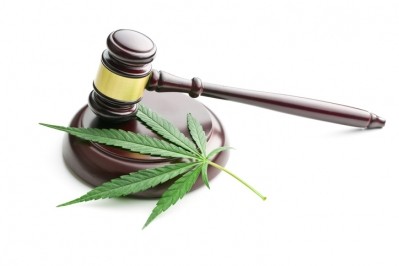FDA to reveal CBD oversight plans soon

Food and Drug Administration officials are expected to roll out a plan for how to regulate cannabis-derived products like CBD in the coming months.
FDA is currently studying whether hemp-derived products such as CBD are safe in food or supplements and plans to make recommendations for how to regulate the growing number of cannabis-derived products in the coming months.
Despite concerns about whether CBD can be safely eaten every day or during pregnancy, as well as potential effects on fertility, FDA officials have confirmed the agency is working to establish a regulatory framework for the legal sale of cannabis-derived products. This could come as soon as early February, according to Loren Israelsen, President of the United Natural Products Alliance.
“I have reason to believe from conversations this week that the agency is moving quickly with a sense of urgency to come out with something. It would not be unrealistic to think 30 days.”
Israelsen explained that FDA is under a tremendous amount of pressure from all sides – pharma, dietary supplements, food and OTC. At this point, they will be criticized all around by everybody, no matter what they do.
“They're thinking that if we're going to get criticized, let's be criticized for doing something.”
Time to move
While the 2018 Farm Bill offered high hopes to many American farmers for a legitimized marketplace, the lack of framework ultimately led to the rise and fall of the hemp and CBD industry. The inaction on the regulatory front wreaked economic havoc on companies, many of which were unable to recover.
“I really feel badly for the companies like Charlotte's Web or the other companies that have really tried to do something here. I hope they survive, I really do,” said Israelsen.
So what took so long? The agency has been preoccupied with a number of challenges. Following the confirmation of an FDA commissioner, overcoming the infant formula shortage disaster, making inroads with COVID, reauthorizing the Prescription Drug User Fee Act (PDUFA) and passing an omnibus spending bill that secured a budget increase for FDA, the agency was finally able to squeeze in CBD in.
“FDA had a job to do and you can't wait five years to solve a problem like this. So the pressure was high and this commissioner said ‘we have a little bit of breathing room. We're going to get this thing done,’” Israelsen said.
Getting this thing done
As states moved ahead with their own legislation over the years, the FDA is now faced with numerous different interpretations.
Israelsen said he expects FDA’s enforcement to be dosage-specific, but complicating matters is that some states won’t allow that.
“That means you're going to have double labeling and packaging for X number of states. FDA is not going to pull the preemption card because they would have to do that legislatively. So I think it just leaves us in a really unsatisfying situation where nobody's going to feel good about this. But all that said, I think that they are probably going to say ‘well, we'll let the DS guys have a little piece of the CBD action’ and what they may not discuss is other cannabinoids. If it does come up, they'll probably take those on a case-by-case basis,” he said.
New cannabinoids have only complicated the agency’s enforcement efforts, as products such as delta-8 have been interpreted by some as meeting the definition of legal cannabis, but are intoxicating.
“Over the last year and a half, we have seen a whole host and cadre of intoxicating hemp-derived cannabinoids come up,” Norman Birenbaum, a senior FDA adviser working on the issue told The Wall Street Journal. “There are very, very different regulatory considerations for products that are going to intoxicate you.”
Consumer safety
The lack of a federal regulatory framework has given rise to concerns about consumer safety and shortcomings in quality assurance that may lead to unintentional THC in some CBD products.
“I don’t think that we can have the perfect be the enemy of the good when we’re looking at such a vast market that is so available and utilized. You’ve got a widely unregulated market, ” Birenbaum was quoted in the WSJ article.
Duffy MacKay, SVP, Dietary Supplements at the Consumer Healthcare Products Association (CHPA), told NutraIngredients-USA that Birenbaum’s comment is especially significant, as he seems to understand that FDA inaction is exacerbating the public health risk.
“For these and other reasons, CHPA has long advocated for FDA to use its existing authority to establish a regulatory pathway and to increase enforcement action against unscrupulous manufacturers. CHPA is hopeful that FDA will finally act on behalf of consumers and issue an interim final rule to create a path to legally market dietary supplements containing CBD derived from hemp,” MacKay said.
Daniel Fabricant, PhD, CEO of Natural Products Association (NPA) is less impressed. Fabricant said while the announcement is encouraging, he has seen this a movie before. “Given the past, since 2019 and basically four years of inaction, fool me once, shame on you. Fool me twice, shame on me.”
Fabricant added that the science is there, but so far it’s fallen on deaf ears. “The data is out there, the science is the science. There's a safe level at which you can consume it [CBD] daily, independent of the drug exclusion criteria and everything else. We have our citizen’s petition in, which asks FDA to review an NDI. I get that maybe a bigger solution broadly on CBD may be problematic for the agency to consider from all sources, but you're telling me, they can't review it on a case-by-case or product by product basis?”
Citizen’s petition
“Given what we know about the safety of CBD so far, it raises concerns for FDA about whether these existing regulatory pathways for food and dietary supplements are appropriate for this substance. FDA is currently reviewing three Citizen Petitions related to this, and we plan to respond to them soon,” FDA Principal Deputy Commissioner Janet Woodcock told WSJ.
One of those Citizen Petitions was filed last year by the Natural Products Association, calling for FDA to either rule that CBD is a legal dietary ingredient or to make a rule allowing enforcement discretion on the substance.
Since passage of the 2018 Farm Bill, FDA’s stance is that CBD is not a legal dietary ingredient because of its prior investigation as a drug in the form of Epidiolex, which is manufactured by English drug company GW Pharmaceuticals. The Agency said that it has received no credible information that CBD containing products were on the market prior the 1994 grandfather date in DSHEA, which would make CBD an Old Dietary Ingredient, and thus not subject to the prior drug development provision.
Melissa Do, Director of Communications, American Herbal Products Association, said the law clearly provides an opportunity for the FDA to grant an exception to the prior drug exclusion for CBD.
"As we have expressed for nearly half a decade, the American Herbal Products Association (AHPA) wants to see FDA use that authority to have CBD products come to market as any other dietary supplement would. We believe FDA should regulate CBD like any other herbal constituent—including by subjecting manufacturers of CBD dietary supplements to generally applicable regulatory controls such as those requiring good manufacturing practices (GMP), facility registration, and serious adverse event reporting," she said.
Do added that as AHPA would prefer to see FDA grant an exception via an interim final rule rather than through standard notice-and-comment rulemaking, which would delay a final action even further. "Our call for this prompter regulatory approach reflects, in part, our concern that American consumers today have broad access to CBD products against which FDA believes it cannot enforce the robust regulatory framework in place for dietary supplements."
The lost sentence
According to Israelsen, one sentence could have prevented all of this.
“If the Farm Bill had one more sentence that said ‘Hemp/CBD are lawful dietary ingredients,’ we wouldn't be having this conversation. But they didn't do it–even though they were told they needed to put that in. This is one of those blown opportunities with a combination of bad luck,” he said.









